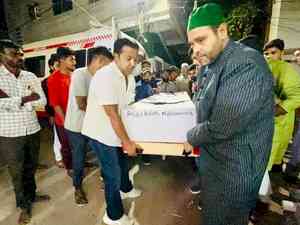NABARD organises district level training programme regarding paddy straw management

Ludhiana, September 18, 2019: National Bank for Agriculture and Rural Development (NABARD), Punjab Regional Office today launched a campaign against paddy straw burning (Crop Residue Management ) in 320 villages of district Ludhiana in district level meeting presided over by Pradeep Agrawal, Deputy Commissioner Ludhiana at Hotel Friends Regency, Opposite Mini Secretariat, Ludhiana today.
Dr Rishipal Singh, Additional Deputy Commissioner (Development) was also present. The meeting was attended by Dr.Harjeet Singh Dhaliwal, Director, PAMETI, Dr.Dharminder Singh (PAU), Rattan Singh Ex Director PNB FTC, Baldev Singh, Chief Agriculture Officer, Ludhiana, Dr Rajbir Singh, Atari, PAU Dr Jaspreet Singh Khera, Project Director, ATMA, Anil Kumar, LDM, Davinder Singh, District Manager, Ludhiana Central Cooperative Bank and officers from Horticulture and Agriculture Department. Parveen Bhatia, DDM, NABARD, Ludhiana coordinated the programme. The issues raised by the farmers and possible solutions to the issues were deliberated. PAU/ATMA and PAMETI experts discussed about sowing made by happy seeders, insitu sowing and possible alternate use of straw.
Pradeep Agrawal, Deputy Commissioner Ludhiana appreciated the efforts being taken by NABARD to curb stubble burning. He said with the efforts of all relevant departments, stubble burning has been reduced remarkably last year. It is the need of the hour to make farmers aware about the ill-effects of stubble burning.
In inaugural speech Parveen Bhatia informed that Paddy-wheat is the major crop rotation occupying an area of 29.7 Lakh ha and 35.06 Lakh ha respectively. With high mechanization and extensive agriculture practices in Punjab, 80 % of wheat and 90% of paddy is harvested by combine harvesters. Harvesting by combine harvester leaves behind the stubble in the fields. With narrow time in hand before next sowing and limited options farmers have, easiest way to manage stubble is to burn it in the fields. It is estimated that around 20 million tonnes of paddy straw is generated and about 75-80% of it is burnt in fields. Stubble burning in field leads to various issues with respect to pollution, soil nutrient loss, increment in CO2 emission and suspended particulate matter in atmosphere affecting environment and human health.
Stubble burning is the main contributor to climate change in the State and also the major concern for stakeholders. Impact of burning on agriculture is huge in terms of loss of soil nutrient and organic matter, loss of soil moisture, etc. Only loss of nutrients can approximately count up to Rs. 1410 per hectare apart from intangible losses of organic content, moisture and micro-nutrients.
To address the environmental problems accentuated by crop residue burning, there is a constant need to educate the farmers. Hence, NABARD Punjab Regional Office is conducting a campaign during this year to spread the message of crop residue management and crop diversification to all paddy growing villages through 320 village level cluster awareness programmes and other mass awareness media using IEC (Information, Education and Communication) techniques in district Ludhiana . ‘Master Trainers’, trained by NABARD, will train village level workers who shall be working at cluster/village level. The campaign has three levels of programmes viz. district, block and village level. The campaign will run during September-October 2019 before the paddy harvesting starts. Teams comprising of two village level workers to facilitate the programme in the designated villages of the district involving youth volunteers, Panchayat members, farmers and women.
The main goal of the campaign is to reduce stubble burning and avoid environmental pollution and mitigate climate change. The campaign will focus on objectives like Creating climate change awareness and about ill effects of stubble burning, Demonstration/awareness on use of various machineries/practices, Awareness on alternate uses of paddy straw, Adoption of various machineries, alternative practices and technologies by farmers, Improve soil health – Organic matter and nutrients.

 cityairnews
cityairnews 















